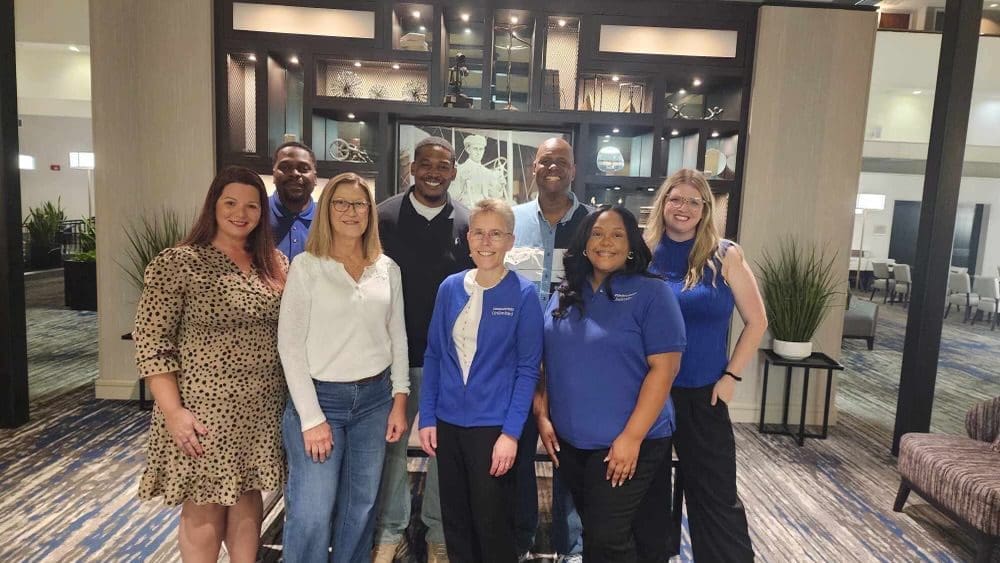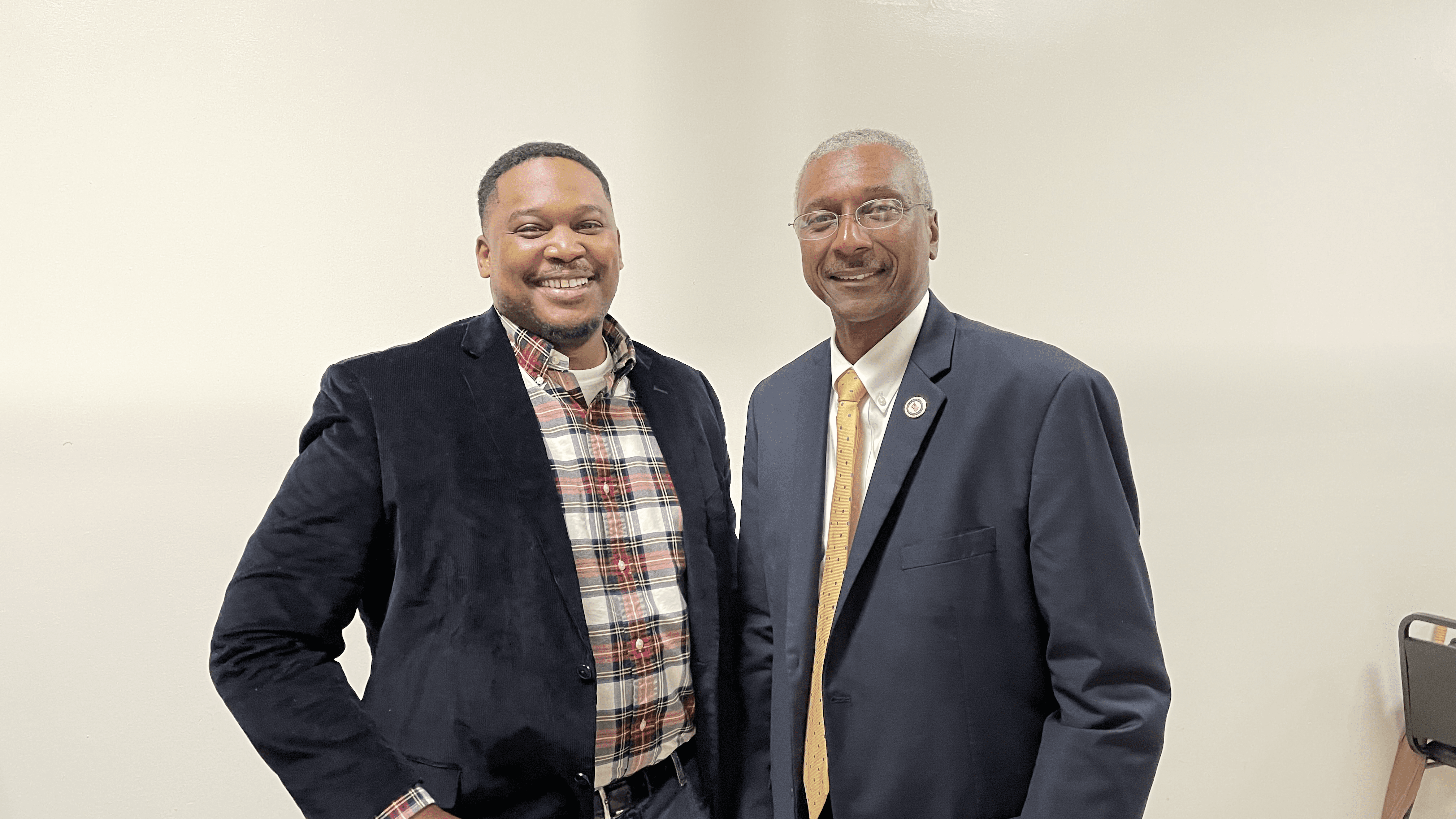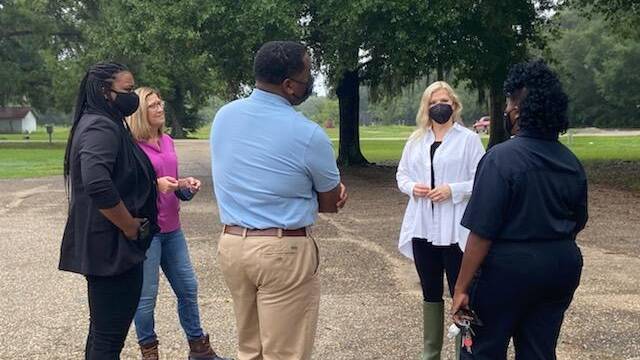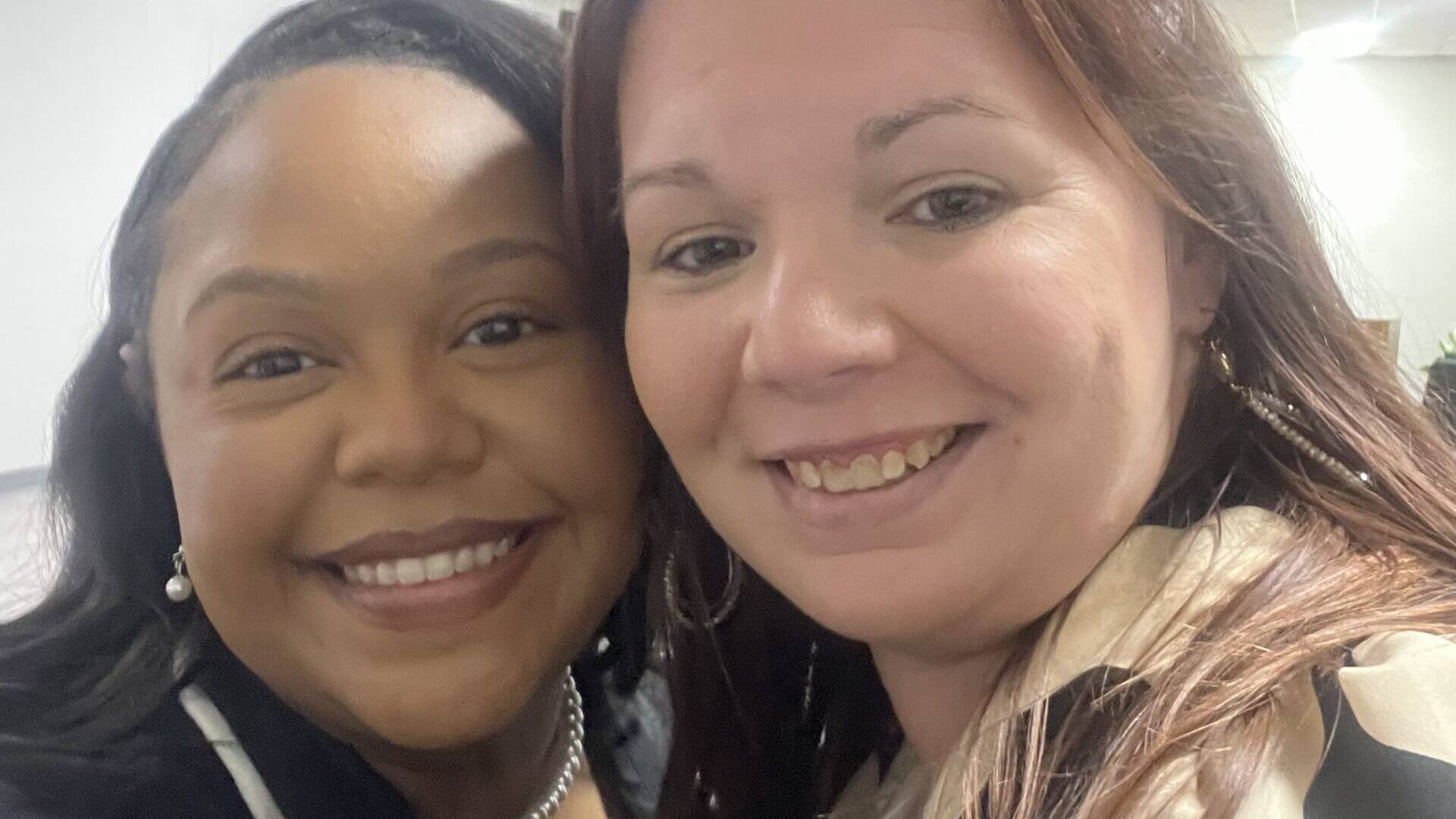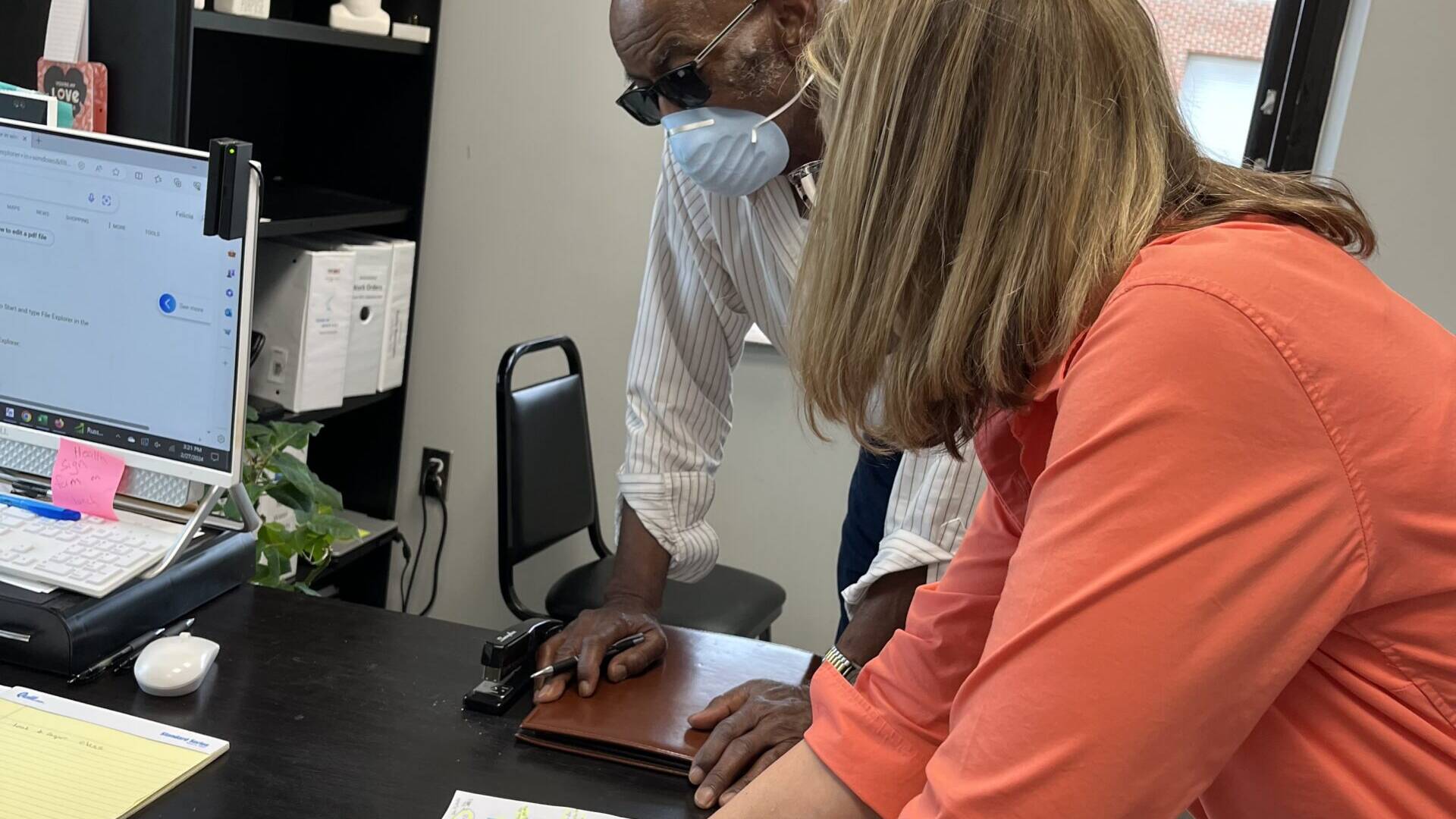Telling the story of how Communities Unlimited (CU) collaborates with a community over two decades is no small task, and such is the case in White Hall, Alabama. CU first engaged with the town in 2004, helping address the town’s most pressing need: wastewater infrastructure. What began as an effort to solve a critical problem has since grown into a holistic partnership spanning CU’s Entrepreneurship, Community Infrastructure, and Community Sustainability programs.
White Hall is in Lowndes County, located in south-central Alabama within the Black Belt region, where communities have long grappled with persistent poverty, failing septic systems, and inadequate infrastructure. Today, White Hall’s transformation showcases the power of possibility when CU’s strategic blending approach is put into action.
Building the Foundation: The Early Days (2004)
CU’s initial engagement in White Hall began in 2004 when former staffer Jeff Cooley responded to national attention on Lowndes County’s wastewater crisis. At the time, residents were facing fines and even jail time due to inadequate septic systems. In White Hall, this rural area is dominated by farmland, but the heavy clay soil poses challenges for effective septic and wastewater systems.
CU partnered with local and national organizations to form the Black Belt Water and Sewer Authority, initiating efforts to address the town’s infrastructure needs and laying the groundwork for future progress.
A New Chapter: Reconnecting in 2022
In 2022, CU reconnected with White Hall through the “Closing America’s Wastewater Gap Pilot Program,” a joint initiative by the U.S. Environmental Protection Agency (EPA) and U.S. Department of Agriculture (USDA). At the request of USDA State Director Nivory Gordon and newly elected White Hall Mayor Delmartre Bethel, CU East Regional Area Director Alexander Brandon led the project. Alexander worked with the mayor, USDA, EPA, and Environmental Research Group (ERG) to assess critical issues, including a small wastewater package plant serving only 45 homes and failing septic systems throughout the community.
While the Alabama State Revolving Fund (SRF) program presented funding options, CU discovered that operating a centralized system would be financially burdensome, as most residents live below the poverty level. To help address immediate needs, CU partnered with USDA, EPA, and Alabama Rural Water Association (ARWA).
Meanwhile, CU provided homeowners with septic system care guidance and loan options during a community Back-to-School event led by Alexander and CU State Coordinator Dinah Foreman. They also collaborated with the Office of Community Services (OCS) to demonstrate how OCS RCD funding supported these efforts.
By February 2024, White Hall secured $450,000 from SRF through the Alabama Department of Environmental Management to improve wastewater infrastructure and protect families from raw sewage. In Lowndes County, many homes face sewage overflows due to failing pipes, worsened by heavy rains. With support from the EPA’s WaterTA program, White Hall successfully applied for federal funding to accelerate these efforts.
In January 2025, ADEM awarded an additional $716,894 from the Drinking Water State Revolving Fund (DWSRF) to replace aging water lines, install a new well and pump, upgrade system valves, and connect residents with contaminated private wells to public water. These investments will enhance water quality, reduce water loss, and improve system reliability.
Expanding Focus: 2023 and Beyond
By 2023, CU expanded its efforts in White Hall beyond wastewater infrastructure. Geographic Information Systems (GIS) Project Manager Trent Neathery mapped the town’s water system to enable better planning and maintenance for future projects. CU also submitted Community Facilities (CF) grant applications for equipment, including a backhoe and a police vehicle.
“I've had a great experience working with CU. I've been able to accomplish a lot of different things. Since I started working with them, I’ve been able to utilize each different aspect they offer. In a small town like White Hall, it's hard to get the support that you need. Just being able to pick up the phone and call one of your team members, explain the situation, and have them guide me in the right direction has helped carry me through my first term as mayor.”
— Delmartre Bethel, Mayor of White Hall
CU’s involvement expanded through its Community Sustainability Team, with Community Facilitator Amanda McBride playing a role. Since June 2024, Amanda has been working closely with Mayor Bethel, focusing on building the town’s waste management infrastructure. What began as a discussion around household waste has evolved into the creation of a waste management department. Amanda has been instrumental in this effort, providing support through grant proposals, research, and planning.
Entrepreneurship Support for the Mayor’s Businesses
CU’s Entrepreneurship Team, led by Management Consultant Katy Parrish, has helped Mayor Bethel refine his vision for his businesses — Creative Visions, LLC, an event and décor company, and Better Maid Cleaning, a commercial janitorial service serving White Hall and the Montgomery area. Katy provided guidance on business planning, loan preparation, and government contract bidding while organizing financial records and operational documents. With her support, Mayor Bethel has increased revenue and margins, positioning Better Maid Cleaning for sustainable growth. CU is now exploring funding options to further expand his businesses.
Sustaining Momentum
With Alexander Brandon transferring oversight of White Hall to CU Community Environmental Management Specialist Bria Hines last year, progress on the town’s water and wastewater systems is steadily moving forward. Bria has focused on updating policies and procedures to address sanitary survey issues and ensure proper implementation within the community.
She and Dinah have provided hands-on training for both the water operator and the clerk, helping them better understand their responsibilities and improve reporting accuracy. This effort aims to keep White Hall compliant with ADEM regulations and prevent future problems. Additionally, Bria, who assisted with the paperwork for the CF applications with Alexander, is actively monitoring their status.
“Collaborating with Mayor Bethel and Juwana (Stringer), the water clerk, has shown me the resilience and dedication of this community,” Bria said. “Watching them come together to improve their water systems and move forward with such determination has been amazing.”
Although no formal CU Healthy Foods initiative has been implemented in White Hall due to limited grant funding, the town has expressed interest in incorporating a community garden into its future development plans. The garden would engage senior citizens and local youth while supplying produce to schools or a future farmers’ market. CU’s Infrastructure Team previously held discussions with the Broadband Team to explore potential collaboration on broadband and internet access initiatives in White Hall. While no immediate outcomes resulted, White Hall remains interested in pursuing this program in the future.
Community Vision for the Future
Mayor Bethel is focused on housing and park development in his next term. He sees opportunities to attract investments and build upon the momentum created over the past few years. “I’ve seen the town be stagnant for some time, and the only way to make a difference is to be part of that change,” he said.
Reflecting on his experience, Alexander Brandon shared, “When I first met Mayor Bethel, I was inspired by him. He made it clear that his community had been left out of funding in the past, but he was determined to change that. He really is a champion for White Hall and all that it can be.”
Amanda McBride echoed that sentiment. “He has a clear vision for his community and is committed to seeing it through. I’m excited to help bring some of White Hall’s goals to life.”
After 20 Years: Where We Are Now
White Hall’s journey exemplifies what is possible when CU’s resources are strategically blended to foster long-term growth, economic development, and self-reliance. With infrastructure improvements underway, community businesses growing, and new projects on the horizon, White Hall is no longer stagnant — it is evolving.
“Over the next couple of years, I see us continuing to grow economically because we have the interest and drive to develop and attract investments. I look forward to working with Communities Unlimited to keep this progress going.”
— Delmartre Bethel
So, where is White Hall after 20 years of work with CU? Progress continues as the community and residents look toward a brighter future.


